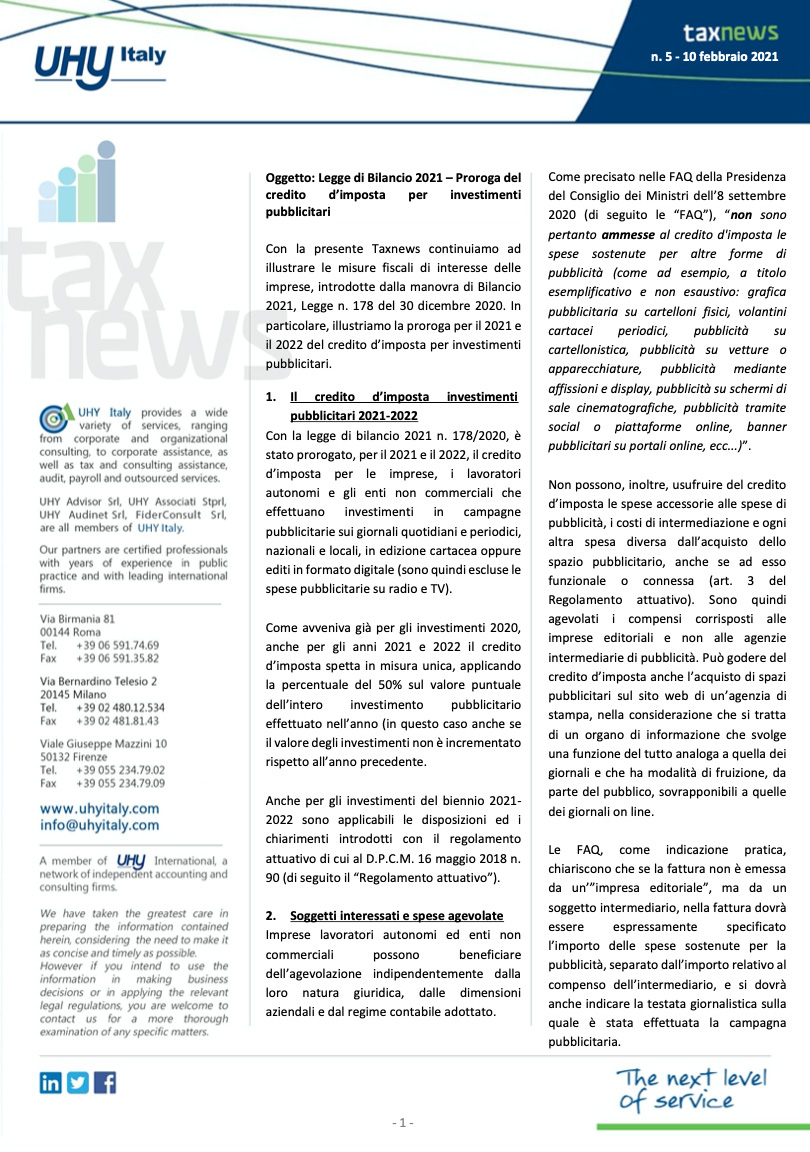

Emanuele Falorni - 15/09/2023
Tax News 1/2023 del 15.09.2023
Obligation to disclose the
In this issue of our Taxnews, in view of the November 30, 2023 deadline for the telematic submission of the tax return for the tax period 2022 (for
1. The beneficial owner information to indicate in the tax return
A new line RU150 named "beneficial owner" has been inserted in the RU box of the 2023 Income Tax Return of corporations, partnerships and individuals. This line is to be filled in if the taxpayer benefited from the following relief measures in tax years 2020, 2021 and 2022:
a) tax credit for investments in new capital goods (referred to in Law No. 160/2019 and subsequent extensions), with reference to both investments in ordinary capital goods and the so-called "4.0" capital goods referred to in Annexes A and B of Law No. 232/2016;
b) tax credit related to research, development and innovation activities (referred to in Law No. 160/2019 and subsequent extensions);
c) tax credit for training 4.0 (referred to in Law No. 205/2017 and subsequent extensions).
Specifically, as clarified by the instructions to the 2023 Income Tax Return, in line RU150 the beneficiaries of the tax credit are required to indicate the data on the beneficial owners of the funds (in this case, tax credits), pursuant to Article 3(6) of Directive (EU) 2015/849 of the European Parliament and of the Council (Anti-Money Laundering Regulations).
2. The data to be reported
For each individual who qualifies as a beneficial owner, the following should be indicated in the appropriate fields of line RU150:
- the reference tax periods (2020-2021-2022) for which the beneficiary used the credit;
- for residents: the fiscal code;
- for non-residents without fiscal code: firstname, surname, date of birth, code of the foreign Country of birth;
- the registered domicile in the territory of the State, if different from the registered residence: address, city/municipality/province, postal code;
- data on the foreign registered residence, if any: foreign state code, address, town, federal/province/county state. If different from the foreign registered residence, also indicate the registered foreign domicile: address, city, state/province/county, foreign state code.
3. Criteria for identifying the beneficial owner
Considering the reference to the anti-money laundering regulations, it should be recalled that the relevant norms for identifying the beneficial owner are contained in Legislative Decree No. 231/2007, as amended by Legislative Decree No. 90/2017, implementing the Fourth Anti-Money Laundering Directive.
Specifically, for subjects other than natural persons, pursuant to Article 20(1) of Legislative Decree No. 231/2007, the beneficial owner coincides with the natural person or persons to whom direct or indirect ownership or control is attributable.
The ways in which identification is to be provided are gradual, and not alternative, following a pyramidal path.
The criteria are differentiated according to the subject as follows:
A - In the case of corporations and assimilated entities (spa, sapa, srl of all types, cooperatives, mutual insurance companies, consortia with external activities), beneficial owner means:
A.1 the natural person (or persons) with a direct or indirect (through subsidiaries, trust companies or intermediaries) shareholding of more than 25 percent of the capital. In the event that more than one person holds more than 25 percent of the shareholding, they are all to be regarded as beneficial owners, regardless of whether any one of them holds an absolute majority.
A.2 In cases where the examination of the ownership structure does not doubtlessly allow the identification of the natural person or persons to whom direct or indirect ownership of the entity is attributable, the beneficial owner will coincide with the natural persons to whom control of the entity is ultimately attributable by reason of:
- control of the majority of the votes exercisable at the ordinary shareholders' meeting;
- control of enough votes to exercise a dominant influence at the ordinary shareholders’ meeting;
- the existence of special contractual ties that allow the exercise of a dominant influence.
B - In the case of partnerships and other multi-person entities without legal personality (simple partnerships, snc, sas, unrecognized associations, unrecognized committees, condominiums, etc.), no special criteria for identifying beneficial ownership is identified. The doctrine considers it appropriate to apply the criteria identified for corporations.
C - In the case of a private legal person under Presidential Decree No. 361/2000 (foundations, recognized associations, recognized committees, mutual aid societies with legal personality) the following are cumulatively identified as beneficial owners:
- the founders, if alive;
- the beneficials, when identified or easily identifiable;
- the holders of powers of legal representation, management and administration.
D – In the case of express trusts under Law No. 364/1989 and related legal institutions, the settlor, trustee, guardian, beneficiaries or class of beneficiaries, and other natural persons exercising control over the trust or related legal institution and any other natural person ultimately exercising control over the property vested in the trust or related legal institution through direct or indirect ownership or through other means are deemed to be beneficial owners.
4. Residual criterion:
Where the application of the aforementioned criteria does not allow the unambiguous identification of one or more beneficial owners, the beneficial owner shall coincide with the natural person or persons holding, in accordance with their respective organizational or statutory structures, powers of legal representation, administration or management of the company or client however different from the natural person.
5. Availability of beneficial owner information
Finally, the retrievability of the aforementioned information should be ensured by the directors of the company, considering that companies with legal personality and private legal persons are obliged to obtain and keep, for a period of not less than five years, adequate, accurate and updated information on the actual ownership of the entity (Art. 22, paragraph 3, of Legislative Decree No. 231/1997).
Basically, these information must be acquired by the directors, also on the basis from what appears from the accounting records and financial statements, the shareholders book, the notices of ownership or control of the entity, as well as notices received from shareholders and any other information available to them.
If doubts still remain as to beneficial ownership, the information shall be acquired by the directors, following an express request addressed to the shareholders with respect to whom it is necessary to further investigate the extent of the interest in the entity.
